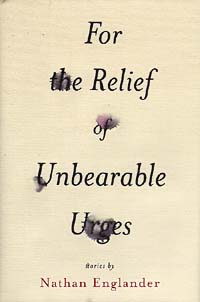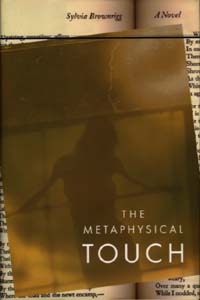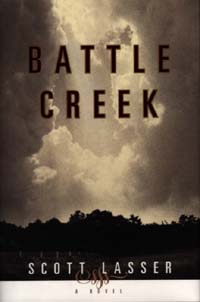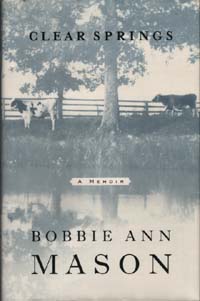https://www.austinchronicle.com/books/1999-06-11/522165/
Book Reviews
For the Relief of Unbearable Urges: Stories
June 11, 1999, Books
Knopf, $22 hard
 At a glance, young Nathan Englander seems to have it all: a wildly hyped debut collection of short stories published by Knopf, a pad in Jerusalem, and yards upon yards of a frizzy rock-star hairdo. Not to mention the most compelling and strangely pleasing book title to be put into print in a while. His nine stories in For the Relief of Unbearable Urges can be conveniently described as explorations of Jewish life at various stages in this century, both at home and abroad. But Englander seems to be out for more than exploration with his text -- at their best, his stories assume the unbearable urgency of a historical function. That is to say, Englander's prose reaches beyond a personal scope and attempts to seduce the narrative of our century. A tall ambition indeed for a boy with a frizz-rock hairdo.
At a glance, young Nathan Englander seems to have it all: a wildly hyped debut collection of short stories published by Knopf, a pad in Jerusalem, and yards upon yards of a frizzy rock-star hairdo. Not to mention the most compelling and strangely pleasing book title to be put into print in a while. His nine stories in For the Relief of Unbearable Urges can be conveniently described as explorations of Jewish life at various stages in this century, both at home and abroad. But Englander seems to be out for more than exploration with his text -- at their best, his stories assume the unbearable urgency of a historical function. That is to say, Englander's prose reaches beyond a personal scope and attempts to seduce the narrative of our century. A tall ambition indeed for a boy with a frizz-rock hairdo.
Every now and again throughout these nine stories, Englander does succeed in making the historical and personal sweetly indistinguishable. The most engaging story of the collection, "The Tumblers," follows a small group of Hasidic Jews who are rounded up from their proudly isolationist village and shipped off to a death camp by Nazis. Upon boarding their train, they are mistaken for circus acrobats by the gentile passengers already on board. In order to remain hidden and safe, the displaced villagers must secretly scrap together a circus tumbling routine complete wih glittering costumes before the train reaches its unknown destination. Their life-or-death rollick under the tent is recorded with tense and measured tragedy: "Feitel, off his mark, missed his wife as she came toward him in a leap. Zahava landed on her ankle, which let out a crisp, clear crack. She did not whimper, quickly standing up. Though it was obvious even from the balcony that her foot was not on right. There was, after a gasp from the audience, silence."
Most of Englander's other stories seem to rise and form from similarly curious premises. In "Reb Kringle," a New York Orthodox Jew who works as a department store Santa Claus loses his cool and goes ballistic in a store full of tiny and terrified gentiles. The title story refers to the unbearable urges for sex an Israeli man suffers as his wife menstruates for weeks without end. "The Gilgul of Park Avenue" follows a financial analyst's lightning conversion to Judaism after he has a taxicab epiphany: "Ping! Like that it came. Like a knife against glass."
But despite Englander's smart touch and charm, portions of his text do miss their marks. The unifying voice responsible for telling these nine stories frequently spends too much time talking and not revealing the beautiful pictures and echoes that hide in the stories. The result of this unfocused impulse is a somewhat stagey, less convincing voice that is a bit overeager to point out the rich ironies and wit of the author's ideas."These were simple people with simple beliefs, who simply wanted to be left to themselves," Englander blankly writes of the villagers in "The Tumblers." Much more enthralling are the episodes that display their sad simplicity, including one character's repeated smuggling of potatoes. At their weakest points, his sentences start to fit loosely together and render dull the normal richness of his prose. The psychotherapy story "Reunion," for instance, is difficult to enjoy for its buoying, disconnected clusters of curt lines.
In the end, though, Englander's stories are worthy of much of the praise they have already received, even if much of this praise has been strangely misguided. Words like "hilarious" and "irreverent" are often used to describe the flashier points of his text. Truth be told, these stories are written with a huge amount of reverence for history and the Jewish identity, and only occasional ounces of outright humor. What carries them through their passing moments of buoyancy, and above the generic rubric of "clever," is a sincerity and solemnity that is a pleasure to discover beneath Nathan Englander's have-it-all image. --David Garza
The Metaphysical Touch
by Sylvia Brownrigg
Farrar, Strauss, & Giroux, $23 hard
 This novel falls between chairs. The author seems to have done her best to make it a thought-provoking, highbrow work. She isn't able to pull that off, but the result of her efforts might appeal to middlebrows with delusions of grandeur -- who buy a lot of books. It could be commercially successful, because Ms. Brownrigg uses some tried and true formulaic devices. In fact, the blurb on the back of my copy reads, "The Metaphysical Touch is a moving and original love story, at once modern and timeless." Those clichés should tell you which readers FSG is targeting.
This novel falls between chairs. The author seems to have done her best to make it a thought-provoking, highbrow work. She isn't able to pull that off, but the result of her efforts might appeal to middlebrows with delusions of grandeur -- who buy a lot of books. It could be commercially successful, because Ms. Brownrigg uses some tried and true formulaic devices. In fact, the blurb on the back of my copy reads, "The Metaphysical Touch is a moving and original love story, at once modern and timeless." Those clichés should tell you which readers FSG is targeting.
In 1991 the protagonist, Emily Piper, or, Pi, as she's generally referred to, is writing her Ph.D. dissertation in philosophy for the University of California at Berkeley. She's had a brilliant academic career and seems to have, by philosophy grad students' standards, a great career ahead of her. But a huge fire destroys her home and she's devastated. Her nearly complete dissertation, her papers, her books, all go up in smoke.
The prospect of beginning again daunts Pi to the point where she drops out of the academic world, at least temporarily, moving in with the aunt of one of her girlfriends in the wealthy, arty community of Mendocino. She supports herself with her savings and a part-time job. So the main theme of the book is if, how, when, and where Pi can put her life together again.
Well, one way Pi can turn things around, as readers of popular novels know, is with the love of a good man or woman. With Pi it doesn't matter because she's bisexual and has had serious romantic relationships with both. She gets it on in person with her landlady, Abbie, who, despite her advanced years (she's 40) is beautiful, and also has an adorable little daughter. And she has an intense, if not physical, relationship with a guy who calls himself J.D. on the Internet. J.D. describes his life this way: "Worked on a weekly paper, bummed around, wrote half a bad novel. Discovered I was able to understand computer systems, hence got a decent support staff job. Worked for several years. Gained a feeling of self-respect. Then, abruptly, through no fault of my own, the recession hit and I got FIRED."
Since then he hasn't been able to pick up the pieces.
So J.D. starts posting a series of notes on the Internet in which he discusses the possibility of his committing suicide and chronicles his wandering around the country, making all sorts of comments that are supposed to be witty and perceptive. I don't think they're either, but Ms. Brownrigg does, because in her novel J.D. develops a cult of suicide watchers; even the folks at People get wind of and do an article on him. He's also getting tons of electronic mail from his readers, but answers no one until Pi finds out about him and writes. Well, she's so bright and compassionate that he can't resist. They begin to correspond, with Pi using the name Sylvia, for Sylvia Plath.
Each recognizes the other as something special and they work their butts off trying to impress, discussing such issues as "Is There a God?" and exchanging views on Rex Harrison. They're being geniuses together and it looks like J.D. may have found a reason to go on. But on the way to L.A., where he's to go to his mother's house, with Pi waiting for him, J.D. gets killed in an automobile accident that just happens to occur during the 1992 Rodney King riots. Doesn't commit suicide, gets killed accidentally. On the verge of maybe finding himself.
Isn't that just devastatingly ironic?
I appreciate, I really do, Ms. Brownrigg's awareness that losing a job or a book collection can badly unhinge someone. That's not as widely recognized as it should be. But her plot is gimmicky, her style is anonymous, and she's not, here at least, particularly funny or insightful. -- Harvey Pekar
Battle Creek: A Novel
by Scott Lasser
Rob Weisbach Books, $24 hard
 I bet author Scott Lasser would like to shoot the pretentious production pundit who describes his novel in the jacket copy as "... a novel of America. To read it is to believe again in the simple things that make our souls strong: courage, faith, and the right to hold on to a dream, no matter how elusive." My own reading experience fell a little short of this spiritual awakening. Nevertheless, this novel about three generations of men, written by a man -- and Lehman Brothers bond trader to boot -- is one of the better novels to come along this year. The basis for this conclusion is difficult to put a finger on. There's little art to Mr. Lasser's writing. His prose style is journalistic. There's not one descriptive phrase that leaves us breathless. Pick the novel apart line by line, and nothing much stands out as exceptional. And yet, when you stitch it all together, you've got yourself one warm, compelling, heart-wrenching, fascinating story.
I bet author Scott Lasser would like to shoot the pretentious production pundit who describes his novel in the jacket copy as "... a novel of America. To read it is to believe again in the simple things that make our souls strong: courage, faith, and the right to hold on to a dream, no matter how elusive." My own reading experience fell a little short of this spiritual awakening. Nevertheless, this novel about three generations of men, written by a man -- and Lehman Brothers bond trader to boot -- is one of the better novels to come along this year. The basis for this conclusion is difficult to put a finger on. There's little art to Mr. Lasser's writing. His prose style is journalistic. There's not one descriptive phrase that leaves us breathless. Pick the novel apart line by line, and nothing much stands out as exceptional. And yet, when you stitch it all together, you've got yourself one warm, compelling, heart-wrenching, fascinating story.
The novel's pace, for one thing, is deftly plotted, but Mr. Lasser's truest strength is an unassuming genius for characterization, all the more remarkable when one realizes he's accomplished this via omniscient narration. Few characters in contemporary fiction live, strive, cope, sweat, and endure as vividly as this team of wannabes and has-beens. These men play baseball for the exact reason that Patron arrived at the same time each evening to sit in the same place in that Spanish Cafe in Hemingway's "A Clean, Well-Lighted Place." They know baseball is the one thing left in a lifetime of disappointments to connect them to their world, and, more importantly, to each other. And they'll do pretty much anything before they sever this last, fraying thread between themselves and total alienation. The end result is a novel with enough charm, compassion, grit, and allure to rise above the pack.
Battle Creek is the perfect gift for Father's Day, especially for dads who don't read fiction much or even at all. If they've ever loved the game, they'll love the novel. And while they read it, their thoughts will drift to their memories of sandlots and pick-up games, then on to the often troubled relationships between their own fathers and sons, and last, the nature of their own chosen rituals unconsciously designed to bind them to other men. The accessibility of Lasser's nuts and bolts style -- his ear for the simple, dispassionate language of men -- will attract new readers to literature. That's a wonderful accomplishment for any writer, but virtually a criminal act from a first novelist with a lucrative day job. -- David Marion Wilkinson
Such a Pretty, Pretty Girl
by Winston Groom
Random House, $23.95 hard
I like a good detective novel as much as the next reader. A good thrill ride, jumping from location to location, meeting strange and lurking and mysterious, often beautiful, characters. Elmore Leonard, Raymond Chandler, Dashiell Hammett. Exciting, plot-driven stories that don't let you go, won't put you down, until you find out who killed who and where and why and how. These make good summer reads.
Such a Pretty, Pretty Girl, however and unfortunately, is no gem. Winston Groom, author of the acclaimed and oft-quoted Forrest Gump (and other novels, but none of them have made it to the big screen, yet), has written himself another Hollywood novel. The plot is trite and bland, not to mention implausible and predictable. The characters have fallen out of the worst "How to Write a Mystery Novel" informal class, and the writing -- well, Forrest may as well have written the book.
Johnny Lightfoot, middle-aged screenwriter and novelist, living between California and New York, falls once again into the charms of his former lover, Delia Jamison, who is married and gorgeous and intelligent, and a news anchor -- famous news anchor, of course -- who finds herself blackmailed by, well, mail. Letters. Explicit, embarrassing, personal letters sent by some former lover, which one she's not sure, who orders her to play little stripteases before commercial breaks on the nightly news. No threats, just requests. Unbutton a couple of buttons, lean over the counter a bit, that's a nice girl, etc., etc. She enlists the help of Johnny, who has some free time between script rewrites and novel writing, and who hopes that maybe they just might, possibly, perhaps rock the casbah just for old times' sake. So Johnny Lightfoot spends the rest of the novel chasing down former Delia Jamison lovers she's listed for him, and the more he searches, the more he learns about Delia Jamison, such a pretty pretty girl who's left behind a trail of heartache, so that it looks like he's never going to get any closer to discovering who wrote the letters or why they wrote the letters, and what I'm wondering is: What is in the letters that is so bad she can't go to the police? Since when can you blackmail someone with details of how good they are in bed? In Hollywood? When the novel finally ends (and it does end, gratefully, only some 300 pages after it begins), you know more than you want to or need to about Delia Jamison (most of the dirt Lightfoot picks up on his old flame acts as distraction, flimsy distraction at that) and if you haven't figured out whodunit, then you won't be too surprised and might feel unsatisfied at best, bored to tears at worst. It is doubtful this one will make it to the big screen.
If life is like a box of chocolates, then this book is one of those orange coconut creams that nobody eats, unless by accident. --Manuel Gonzales
Clear Springs: A Memoir
by Bobbie Ann Mason
Random House, $25 hard
 The explosive changes that rocked America in the years after World War II liberated Bobbie Ann Mason from the Kentucky dairy farm where she grew up. She attended the University of Kentucky, where "learning was like a buffet, and I wanted to devour everything," but after feasting upon the works of J.D. Salinger and Thomas Wolfe she settled upon an English degree. The day after her graduation she moved to New York with "no prospects, no contacts, not even a résumé or letter of introduction." Yet Mason moved to meet the promises she'd shown in life, and life did not let her down. "Going to the big city did not seem bold or brave to me," Mason writes. "It merely seemed inevitable."
The explosive changes that rocked America in the years after World War II liberated Bobbie Ann Mason from the Kentucky dairy farm where she grew up. She attended the University of Kentucky, where "learning was like a buffet, and I wanted to devour everything," but after feasting upon the works of J.D. Salinger and Thomas Wolfe she settled upon an English degree. The day after her graduation she moved to New York with "no prospects, no contacts, not even a résumé or letter of introduction." Yet Mason moved to meet the promises she'd shown in life, and life did not let her down. "Going to the big city did not seem bold or brave to me," Mason writes. "It merely seemed inevitable."
In New York her creative writing teacher from the university gathered several of his students around him and took them to parties where they met famous writers, and together they toured the Bohemian scene in Greenwich Village. "The allure of literary life was as delicious as the rum-raisin ice cream at the Figaro," Mason writes. Her writing professor shared with her much of the conventional wisdom on becoming a writer: "Hold back youthful enthusiasm, and don't emulate that mediocre sludge on television, and avoid sentimental shit about dear old grandparents." Yet after a year in the big city Mason headed for graduate school (despite her teacher's warning that "academic study was anathema to a writer"), landing in Connecticut, where she met her husband and became a part of the back-to-nature movement. Mason had moved full circle, from farm to city and back to a garden, this time in New England.
Mason's memoir parallels her life with that of her family in Kentucky, and she delivers her story with humor, honesty, and a relish for anecdote where a lesser writer might bog down in sentimentality. Mason tells us about the simple rugged life of her family farm, reaching well back into the 19th century to bring us to the 21st. And as she becomes a writer, she moves through a world a galaxy away from the farm of her childhood, but she never forgets that her independence is itself a product of the farm and the generations of women who became increasingly free in thought and finally in action. Mason's ties to the farm helped her realize her potential, as her novel In Country and now her memoir, Clear Springs, demonstrate. --Mason West
Copyright © 2024 Austin Chronicle Corporation. All rights reserved.
